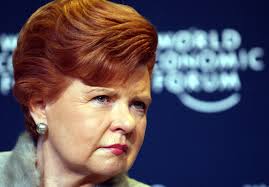Difference between revisions of "Vaira VÄ«Ä·e-Freiberga"
m (Cosmetic style edit) |
m (VERY minor edit) |
||
| Line 10: | Line 10: | ||
Dr. Vaira Vike-Freiberga began her schooling in refugee camps in Germany and continued in French Morocco, first at the elementary school in Daourat and then at the Girls’ College Mers-Sultan in Casablanca. In 1958, she obtained her B.A at the University of Toronto after which she got an M.A in Psychology in 1960 at the same University. Resuming her education at McGill University in Montreal, she earned a doctorate (Ph.D.) in experimental psychology in 1965.In 1998, she returned to Latvia to head the Latvian Institute, a non-profit government organization whose goal is to raise the profile of Latvia and Latvians around the world, which she most successfully accomplished. | Dr. Vaira Vike-Freiberga began her schooling in refugee camps in Germany and continued in French Morocco, first at the elementary school in Daourat and then at the Girls’ College Mers-Sultan in Casablanca. In 1958, she obtained her B.A at the University of Toronto after which she got an M.A in Psychology in 1960 at the same University. Resuming her education at McGill University in Montreal, she earned a doctorate (Ph.D.) in experimental psychology in 1965.In 1998, she returned to Latvia to head the Latvian Institute, a non-profit government organization whose goal is to raise the profile of Latvia and Latvians around the world, which she most successfully accomplished. | ||
| − | |||
=== Special achievements === | === Special achievements === | ||
Revision as of 10:42, 5 August 2014
Dr. Vaira Vike-Freiberga was born on December 1, 1937, in Riga, the Latvian capital. After being elected in 1999, and re-elected in 2003, she was the first female President of Latvia. Since 1957, she has been actively engaged in community service, focusing on questions of Latvian identity and culture, and the political future of the Baltic States. She has actively exercised the powers conferred to the President by the Constitution of the Republic of Latvia and has played a leading role in achieving Latvia’s membership in NATO and the European Union.
Contents
Biography
From 1965 to 1998, Vaira Vike-Freiberga pursued a professorial career at the Department of Psychology of the French-speaking University of Montreal, where she taught psychopharmacology, psycholinguistics, scientific theories, experimental methods, language and cognitive processes. After, she was elected Professor emerita at the University of Montreal and returned to her native land, Latvia. The Prime Minister appointed her as the Director of the newly founded Latvian Institute. In 1999, Vaira Vike-Freiberga was elected President of the Republic of Latvia by the Parliament (Saeima). In 2003, she was re-elected for a second term of four years with 88 votes out of 96. She became Member of the Council of Women World Leaders in 1999.
Education
Dr. Vaira Vike-Freiberga began her schooling in refugee camps in Germany and continued in French Morocco, first at the elementary school in Daourat and then at the Girls’ College Mers-Sultan in Casablanca. In 1958, she obtained her B.A at the University of Toronto after which she got an M.A in Psychology in 1960 at the same University. Resuming her education at McGill University in Montreal, she earned a doctorate (Ph.D.) in experimental psychology in 1965.In 1998, she returned to Latvia to head the Latvian Institute, a non-profit government organization whose goal is to raise the profile of Latvia and Latvians around the world, which she most successfully accomplished.
Special achievements
Her scholarly work had earned her numerous awards from academic and Latvian organizations worldwide. Outspoken pundit on social issues, moral values, European historical dialogue, and democracy, she was awarded the 2005 Hannah Arendt Prize for political thought. Since 1999, she has received many medals and awards, twenty-seven Orders of Merit and ten honorary doctorates.
Publications
Dr. Vaira Vike-Freiberga, member of the Writers’ Union of Latvia since 2004, authored ten books and about 160 articles, essays or book chapters and has given over 250 speeches, allocations and scientific communications in English, French or Latvian.
